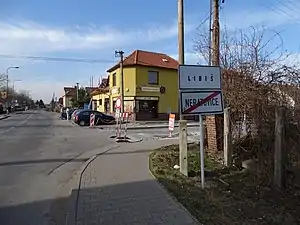Obec
Obec (plural: obce) is the Czech and Slovak word for a municipality (in the Czech Republic, in Slovakia and abroad). The literal meaning of the word is "commune" or "community". It is the smallest administrative unit that is governed by elected representatives. Cities and towns are also municipalities.

Definition
Legal definition (according to the Czech code of law[1] with similar definition in the Slovak code of law[2]) is: "The municipality is a basic territorial self-governing community of citizens; it forms a territorial unit, which is defined by the boundary of the municipality."
Every municipality is composed of one or more cadastral areas. Every municipality is composed of one or more administrative parts, usually called town parts or villages. A municipality can have its own flag and coat of arms.[1][2]
Czech Republic
Almost whole area of the republic is divided into municipalities, with the only exception being military training areas. The smaller municipalities consist only of one village. A municipality has mostly the same name as the settlement which is the most populated and where is the municipal office. However there are many exceptions, for example municipalities created by merger of formerly separate municipalities (like Brandýs nad Labem-Stará Boleslav or Orlické Podhůří).
A municipality can obtain the title of a city (Czech: statutární město), town (Czech: město) or market town (Czech: městys). While all of them are municipalities from the point of view of the law, they are usually referred by its title and not as municipalities, and municipalities without status are called just municipalities. Statutory cities can have self-governing subdivisions, so-called city parts or city districts, which have standing partly similar to small municipalities.[1] Town and market towns are above all ceremonious honorary degrees, referring to population, history and regional significance of a municipality. History and regional significance are reasons, why a small municipality can have the status of a town or market town, and why more populated municipalities don't have any status.
A special type of municipality is the capital Prague, which has simultaneously the status of a municipality and the status of a region and which is treated by special law.[3]
The law makes it possible to restitute by request a status of town for every municipality which lost it (during communist period). A municipality, which want to acquire status of town and never was a town before, must have population over 3,000 and the improvement in status is subject of assessment by chairman of the parliament. For market town status population is not a condition.[1] The newest Czech town is Štěpánov, which obtained the status in July 2020.[4]
Some of municipalities have extended competencies of delegated state administration (pověřená obec, obec s rozšířenou působností) for the territory of the municipality and for surrounding municipalities.[5]
Statistics
| Total | Cities | Towns | Market towns | Municipalities without status | |
|---|---|---|---|---|---|
| Over 99,999 | 6 | 6 | – | – | – |
| 50,000–99,999 | 12 | 12 | – | – | – |
| 25,000–49,999 | 23 | 9 | 14 | – | – |
| 10,000–24,999 | 88 | – | 88 | – | – |
| 5,000–9,999 | 147 | – | 144 | – | 3 |
| 2,500–4,999 | 280 | – | 180 | 7 | 93 |
| 1,000–2,499 | 927 | – | 125 | 111 | 691 |
| 500–999 | 1,368 | – | 16 | 87 | 1,265 |
| Under 500 | 3,403 | – | 13 | 23 | 3,367 |
| Total | 6,254 | 27 | 580 | 228 | 5,419 |
| Total | Cities | Towns | Market towns | Municipalities without status | |
|---|---|---|---|---|---|
| Average | 1,709 | 135,188 | 6,418 | 1,166 | 564 |
| Median | 416 | 66,034 | 4,136 | 1,029 | 371 |
| Minimum | 15 | 35,002 (Třinec) | 73 (Přebuz) | 134 (Levín) | 15 (Vysoká Lhota) |
| Maximum | 1,324,277 | 1,324,277 (Prague) | 37,525 (Česká Lípa) | 3,575 (Nehvizdy) | 5,384 (Petrovice u Karviné) |
| Total | 10,693,939 | 3,650,076 | 3,722,529 | 264,927 | 3,056,407 |
The smallest municipalities by area are Závist (0.42 km2) and Strukov (0.53 km2). The biggest are the cities of Prague (496.21 km2), Brno (230.18 km2) and Ostrava (214.23 km2), and the town of Ralsko (170.23 km2, including a former military area, with only 2,000 inhabitants).[7]
Slovakia
As of 2020, there are 2,890 municipalities in Slovakia, with 141 of them being a city or a town.[8]
After meeting certain conditions such as population over 5,000, being well accessible, having cultural or economical significance and having an urban style of settlement an obec can be declared a town ("mesto").[2]
References
- "Zákon č. 128/2000 Sb. o obcích (obecní zřízení)". zakonyprolidi.cz (in Czech). Retrieved 17 September 2020.
- "Úplné znenie č. 612/2002 Z. z." zakonypreludi.sk (in Slovak). Retrieved 17 September 2020.
- "Zákon č. 131/2000 Sb. o hlavním městě Praze". zakonyprolidi.cz (in Czech). Retrieved 17 September 2020.
- "Ze Štěpánova se stalo město. Chce si tak zachovat stavební úřad či matriku" (in Czech). Olomoucký deník. 7 August 2020. Retrieved 14 September 2020.
- "Zákon č. 314/2002 Sb. o stanovení obcí s pověřeným obecním úřadem". zakonyprolidi.cz (in Czech). Retrieved 17 September 2020.
- "Population of Municipalities – 1 January 2020". Czech Statistical Office. 30 April 2020.
- "Public database: All about territory". vdb.czso.cz. Czech Statistical Office. Retrieved 17 September 2020.
- "Slovenská republika – sumárne údaje". sodbtn.sk (in Slovak). Retrieved 17 September 2020.
External links
See also
- okres
- opština
- municipality
- List of cities in the Czech Republic
- List of municipalities in Slovakia